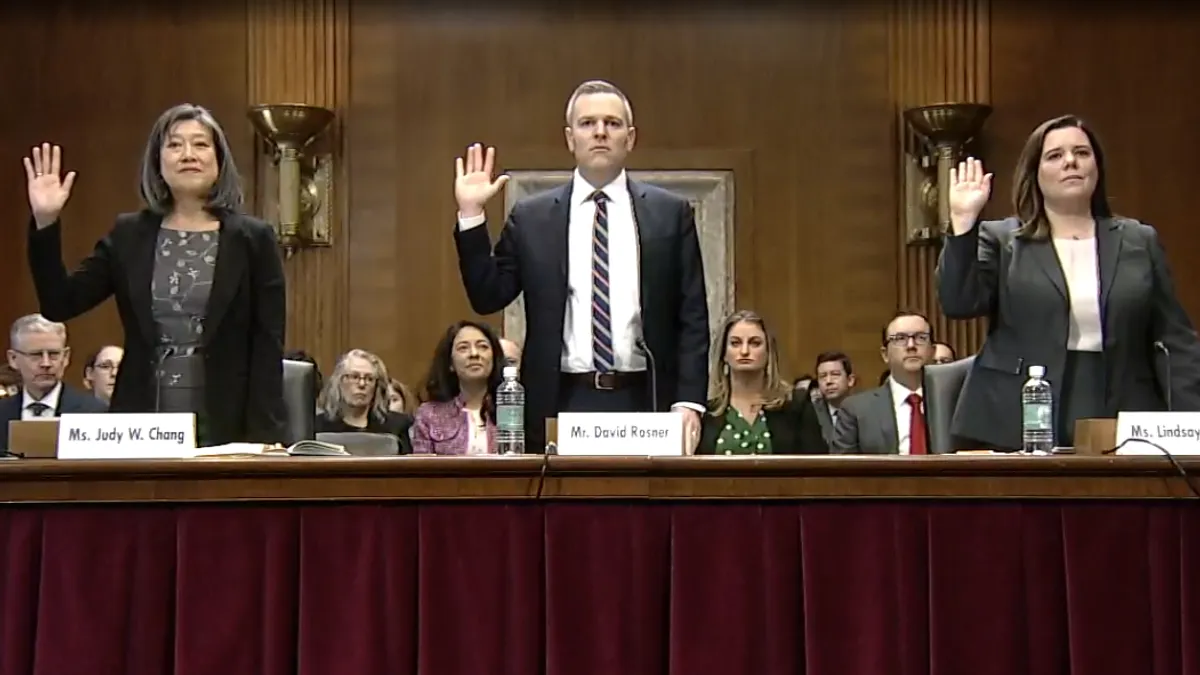Dive Brief:
- The Senate Energy and Natural Resources Committee considered President Joe Biden’s three nominees to the Federal Energy Regulatory Commission at a Thursday hearing, asking them to clarify their philosophies on the commission’s role and what they would prioritize if confirmed.
- Sens. Mike Lee, R-Utah, and John Barrasso, R-Wyo., pressed former Undersecretary of Energy and Climate Solutions for Massachusetts Judy Chang on whether or not her past comments about natural gas pipelines and climate change indicate a bias against gas. Chang said she would uphold FERC’s fuel neutrality.
- FERC currently has three commissioners, the minimum it needs to maintain a quorum. One of those seats expires in June, adding urgency to this confirmation process.
Dive Insight:
The three nominees include Chang, who is currently a managing principal at the Boston-based Analysis Group; Lindsay See, the West Virginia solicitor general; and David Rosner, a FERC energy industry analyst who is currently on detail to the Senate Energy Committee’s Democratic staff.
FERC’s authority and governing statutes were a main focus of the hearing. Each nominee was asked how they assess the scope of the commission’s authority, how they reconcile that authority with its responsibility to ensure grid reliability, and how they would ensure fair cost allocation for interstate transmission projects.
See said she viewed Congress as having strong authority over FERC, saying that if confirmed she would “do no more than what Congress delegated to FERC in the U.S. Code, to stay in FERC’s important but narrow lanes.”
“My role as a state lawyer also solidified my respect for the interplay between state and federal regulators,” she said. “I take the rule of law and separation of powers seriously. I'm committed to the simple notion that agencies have only the power that you, Congress, give to them.”
Lee later asked Rosner if he thought that FERC should be in the “business of regulating environmental and climate impacts beyond what [the National Environmental Policy Act] requires,” although the D.C. Circuit Court of Appeals held in Atlantic City Electric vs. FERC that the commission has no authority outside what is granted by Congress.
“My starting point in considering questions that come before the commission would be the statute, and I think in the case that you're mentioning here, that would be the Natural Gas Act,” Rosner said. “And the Supreme Court has said that the purpose of the Natural Gas Act is to ensure the orderly development of plentiful supplies of natural gas at reasonable prices, so that's where I would start and end in my analysis of that issue.”
The issue of transmission
Lee followed up by asking Chang if she thought it was appropriate for FERC to regulate downstream emissions from a natural gas pipeline project, to which she said that the Natural Gas Act doesn’t specify greenhouse gas emissions as a criteria for denying pipeline projects or specify climate change in its determinations.
Barrasso also pressed Chang on a comment she had made in 2018, in which she predicted that New England would move away from natural gas within the next five years, making it irresponsible to invest in pipelines.
“The future grid for New England may lack sufficient natural gas pipeline infrastructure to meet the region's winter fuel demand,” Barrasso said, citing a Monday report from ISO New England.
“I think the issue is very complex in New England,” Chang said. When Barrasso asked again if she thought building pipelines was fiscally irresponsible, she added, “If I had my magic wand, I would love to have more gas infrastructure and gas supply to New England. But the issues are complicated in New England, and I look forward to an opportunity to work on that.”
Sen. Martin Heinrich, D-N.M., said that the committee had heard testimony from FERC, the North American Electric Reliability Corporation, and the energy industry, that interregional transmission is critical to ensuring reliability — and asked the nominees if they would commit to ensuring a final rule with strong provisions on interregional transmission capacity.
Rosner said this was a priority for him, while Chang said that she sees “many benefits” associated with building out transmission infrastructure, including interregional, and would make it a priority if confirmed to “better understand the constraints” and work with stakeholders.
See said she views transmission as a very important issue and supports the “orderly buildout” of needed transmission, and would work with her fellow commissioners on the issue if confirmed.
Lee raised the issue of cost allocation for transmission lines, asking See if she thought FERC should require Utah ratepayers to pay for California’s future transmission projects if they were built “solely for the purpose of satisfying California's public policy goals.”
“I think it's certainly important for the commission to be looking at what it looks like to have fair allocation in terms of just and reasonable rates,” See said. “I'd be looking very closely at that statutory authority in any of these questions.”
In response to similar questions, Chang and Rosner both said that they agree that only beneficiaries should pay in the context of transmission cost allocation.














